Iran Sentences Two Swedish Citizens To Years Of Prison Over Drug Trafficking
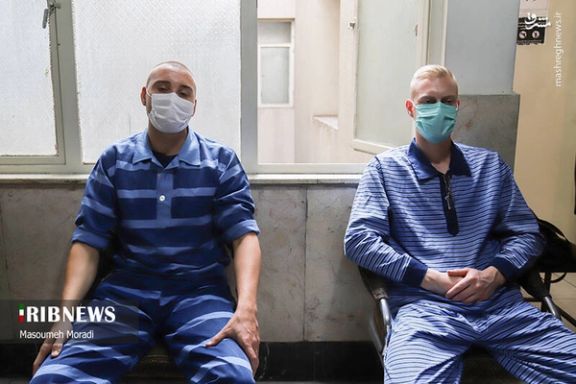
An Iranian court has sentenced two Swedish citizens to eight and five years imprisonment and lashes for drug trafficking.

An Iranian court has sentenced two Swedish citizens to eight and five years imprisonment and lashes for drug trafficking.
During a weekly press conference on Tuesday, Judiciary spokesperson Masoud Setayeshi said the two, identified as Stephen Kevin Gilbert and Simon Kasper Brown, were arrested in January 2020 at an airport in Tehran as they were about to leave the country with large quantities of opium-based narcotics.
"Simon Kasper Brown was sentenced to five years in prison and a fine of about 10 billion rials (about $34,000) for transporting more than 21,000 illegal pills of tramadol," an opioid painkiller, and "Stephen Kevin Gilbert was sentenced to eight years in prison, 60 lashes and a fine, for being in possession of 9.8 kilograms (21 pounds) of opium resin," he said.
The trial of the men — accused of being part of an “international drug trafficking gang” — opened in September 2021. Iran is a key smuggling route for opium and heroin from neighboring Afghanistan, the world’s largest producer.
The judiciary spokesman noted that the case of the pair is different from the Swedish man arrested in July on allegations of “espionage,” whose case is being investigated but his identity has not been revealed.
Tensions are relatively high between Tehran and Stockholm over a Swedish court’s sentencing of former Iranian jailor Hamid Nouri to life imprisonment over executions of political prisoners in 1988.
Earlier in the month, Sweden started planning for the prosecution of two Iranian-Swedish brothers who were arrested in 2021 over allegations of espionage for Iranian Intelligence organizations.
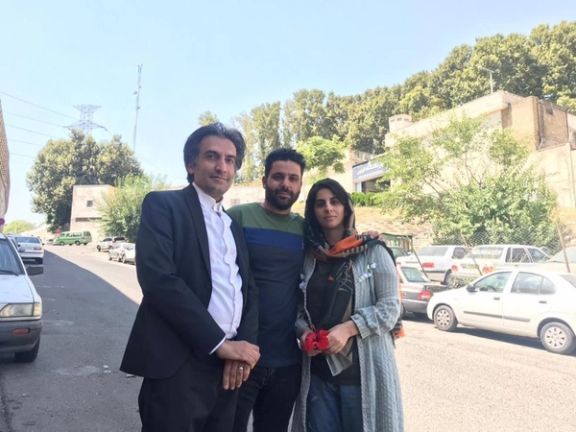
Sepideh Rashno, an Iranian woman who refused to wear a headscarf and whose video of a quarrel with a hijab enforcer went viral last month, has been released on bail.
Reshnou was released from Tehran’s Evin prison on Tuesday after about 40 days of detention with a bail of about $27,000, a huge sum for ordinary people in Iran. She has been charged with propaganda against the Islamic Republic.
Earlier in the month, Revolutionary Court Judge Iman Afshari said that Rashno was summoned from the prison and was served her indictment issued by the prosecutor's office.
She is accused of “association and collusion with the intention of committing a crime against the country's security through communication with foreigners and propaganda activity against the Islamic Republic and encouraging people to commit corruption and prostitution."
On August 15, some women's rights activists staged flash mobs in Tehran to demand information on her whereabouts. She was reportedly in detention at the IRGC ward of Tehran’s Evin Prison since her arrest on July 16 after she argued with a woman enforcing hijab rules.
In a move that was condemned by many activists and people on social media, the state-run television (IRIB) aired on July 31 the so-called ‘confessions’ of the 28-year-old artist, writer and editor.
She was apparently tortured and forced to denounce herself and other activists, and express regret for her confrontation with the hijab enforcer and posting her video on social media. She had been so brutally beaten before the telecast that she was suffering from internal bleeding.
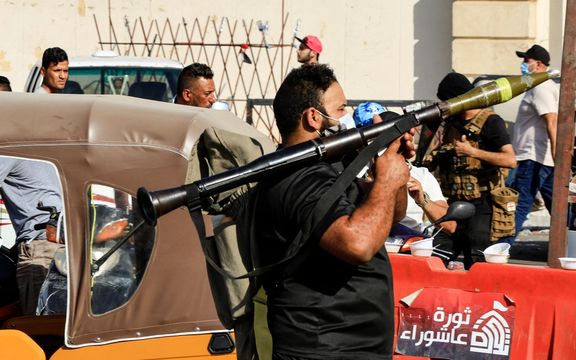
Nearly 20 people were killed in Iraq on Monday as opposition cleric Moqtada al-Sadr’s supporters clashed with Iran/backed militia groups in major cities.
Clashes continued Tuesday, as Iraqi militias fired several rockets at Baghdad’s fortified Green Zone for a second day as hostilities intensified between rival Shi’ite Muslim groups, the military said.
Iran International’s correspondent in Iraq reported Tuesday that Sadr’s armed supporters have occupied all bridges on the Tigris River in Baghdad, except one crossing that kinks to the venue of a gathering by their opponents.
Just before noon local time, our correspondent also reported that pro-Iran politician and former prime minister Nouri al-Maliki's residence in Baghdad was surrounded by Sadrist crowds but pro-Iranian militia were using heavy weapons to defend it. Allegedly dozens of Sadr's supporters were wounded by gunfire.
She also reported that many websites affiliated with political groups, including some belonging to the government, were unavailable on Tuesday.
Streets were mostly empty of ordinary people as gunmen cruised in pickup trucks carrying machine guns and brandishing grenade launchers. Overnight, sustained gun and rocket fire rang out across the Iraqi capital.
Clashes on Monday, which killed nearly 20 people, jolted Iraq into new violence as supporters of al-Sadr, a former anti-US insurgent leader, faced off with Shi’ite armed groups mostly loyal to Iran.
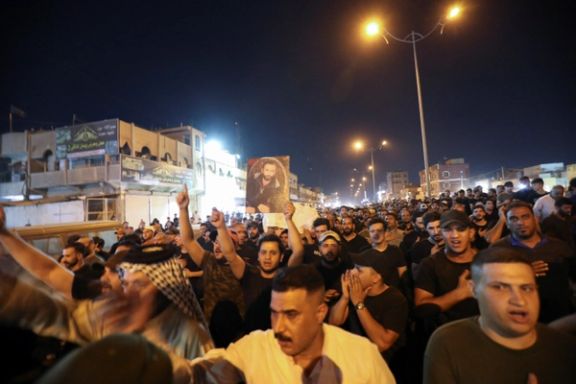
There were reports Monday night that pro-Iran militia fired at Sadrists in Baghdad’s Green Zone, but it is not clear if how many people were killed. In turn, Sadrists said they were targeting offices and bases of pro-Iranian armed groups.
Many foreign governments have urged citizens to leave Iraq. Iranian media reported that all air and land borders with Iraq are closed, as the Iranian embassy in Baghdad and other missions face attacks by Sadrists.
A prolonged political deadlock after an October election, during which the two camps have competed for power, has given the country its longest run without a government and led to new unrest as Iraq struggles to recover from decades of conflict.
This time, the fighting is among the Shi’ite majority that has ruled Iraq since the 2003 US invasion which toppled Sunni dictator Saddam Hussein.
Sadr has positioned himself as a nationalist who opposes all foreign interference, whether from the United States and the West or from Iran. He commands a thousands-strong militia and has millions of loyal supporters across the country. His opponents, longtime allies of Tehran, control dozens of paramilitary groups heavily armed and trained by Iranian forces.
Sadr and his opponents have long dominated state institutions and run large parts of the Iraqi state.
Part of Sadr’s support comes from disgruntled Iraqis who launched anti-government protests in 2019, lasting for months and met opposition from Iran-linked groups. These Iraqis were demanding efficient governance and blamed Iran for interfering in Iraq politics and contributing to corruption and lack of services.
Iraq is one of the world’s largest oil exporters but nearly two decades after Saddam was toppled, still suffers from lack of some basic services such as reliable electricity for people.
With reporting by Reuters

Russia has faced "numerous failures" with Iranian-made drones acquired from Tehran this month for use in Ukraine, Reuters reported quoting a US official.
The official, who spoke on condition of anonymity, said the United States assesses Russia has received the delivery of Mohajer-6 and Shahed-series unmanned aerial vehicles (UAVs) over several days this month. The official said it is likely part of a Russian plan to acquire hundreds of such vehicles.
"We assess that Russia intends to use these Iranian UAVs, which can conduct air-to-surface attacks, electronic warfare, and targeting, on the battlefield in Ukraine," the official said.
Iran is a close ally of Russia and its ruler Ali Khamenei openly praised Vladimir Putin for his invasion of Ukraine.
In July, US National Security Adviser Jake Sullivan told reporters the US has information that shows Iran is preparing to provide Russia with up to several hundred drones.
The Biden administration last month released satellite imagery indicating that Russian officials visited Kashan Airfield on June 8 and July 5 to view the Iranian drones.
Iran's foreign minister, Hossein-Amir Abdollahian, never denying these reports, said last month that Tehran had "various types of collaboration with Russia, including in the defense sector."
On Monday, Ukraine said it broke through enemy lines in several places near the southern city of Kherson as it pressed a new campaign to retake territory. Moscow said Kyiv's counter-offensive had failed as Russia shelled the port city of Mykolaiv.
Reporting by Reuters
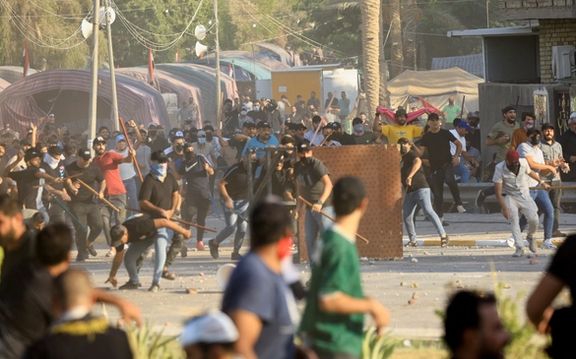
Clashes between supporters of Moqtada al-Sadr and security forces were reported Monday in Iraq after the cleric announced his retirement from politics.
The government announced the postponement of a cabinet meeting, while Iran International’s correspondent in Iraq reported Sadrists storming governorate buildings in provinces including Basrah, south Iraq, and Maysan, also bordering Iran. They were chanting slogans against Iran and its interference in Iraqi politics. Fierce clashed also took place between Sadr's supporters and pro-Iranian groups.
Wary of a deteriorating security situation, the Iranian embassy warned nationals not to go to Kazimayn and Samarah, Shia shrines, and if in Najaf or Kerbalah to stay put.
Sadr – whose role in Iraqi politics goes back to the days of Saddam Hussein, overthrown by the United States-led 2003 invasion – won 73 of 329 seats in last October’s parliamentary election but has been unable to gain office after months of political haggling that has failed to produce a new administration.
The Sadrists withdrew from parliament June 13, prompting supporters to storm the building in July and to remain encamped outside ever since. Sadr’s announcement Monday of his ‘retirement’ enflamed supporters, with some storming government buildings in the fortified ‘green zone,’ central Baghdad.
AFP news agency reported shots being fired, possibly just in the air, and security forces using tear gas. The official news agency INA announced that military authorities had set a full curfew in Baghdad from 3.30pm local time.
Updates from out correspondent in Iraq said that widespread armed clashes errupted after dark between Sadr's militia and pro-Iran armed groups in Baghdad and Basra.
Risk of violent conflict?
After earlier ‘retirements,’ Sadr has returned to politics, and there have been suggestions he is trying to strengthen his negotiating hand over a new government rather than either stepping aside or even trying to seize power. Mustafa al-Kadhimi, caretaker prime minister since May 2020, is sympathetic to Sadr while not an ally.
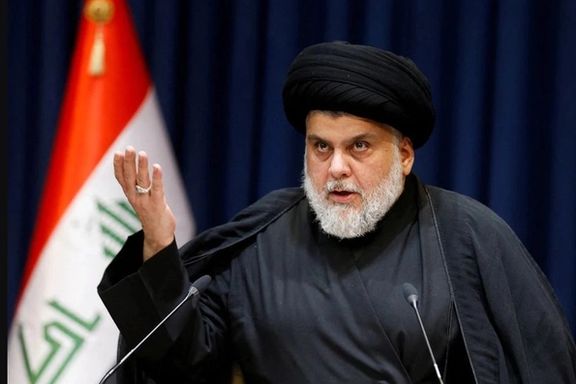
Sadr has a long record of populism, based on active social-welfare networks built up from those of his father, Ayatollah Mohammad Sadeq al-Sadr, who was assassinated in Najaf in 1999. Moqtada Sadr’s Mehdi Army, originally active in resisting the post-2003 US occupation, is now formally part of the Iraqi armed forces alongside other Shia militia.
At various times Sadr has appeared close to Iran, but has more often positioned himself as an ardent Iraqi nationalist wanting to curb both Iranian and US influence. Some US-based analysts have suggested Washington should ally with Sadr against Iraqi groups closer to Tehran they call ‘proxies’, while other analysts have warned that Sadr brings the risk of Iraq falling into violent conflict.
The Coordination Framework, a Shia-led bloc including the Patriotic Union of Kurdistan and some Sunni groups, regards Sadr as an unpredictable firebrand. Common opposition to Sadr, despite other differences, holds the bloc together.
There have also been reports that Washington has tried in recent days to pressure Sadr to resolve differences with other Iraqi groups. Ambassador Alina Romanowski August 24 expressed concern to President Barham Saleh over Sadrists preventing courts functioning by protesting outside judiciary buildings.

Former Mossad director Yossi Cohen says Israel carried out “countless operations” against Iran’s nuclear program when he led the spy agency.
Speaking during an event in Switzerland’s Basel on Monday to mark 125 years since the First Zionist Congress, Cohen denounced the emerging nuclear accord between Iran and world powers, saying that Israel “will continue to do whatever needs to be done” to prevent Iran from acquiring nuclear arms if a deal is signed.
“Without going into too many details, I can tell you the Mossad had many successes in the fight against Iran’s nuclear program,” he said, adding, “We operated around the world and on Iranian soil itself. In the very heartland of the ayatollahs.”
He mentioned as an example the 2018 operation to snatch a trove of Iranian documents -- including draft designs for a nuclear warhead -- which proved Tehran has lied about the military dimensions of its atomic program. "The Iranian regime is lying to the whole world, and we proved it when we brought thousands of documents from the Iranian archives, documents that proved that the Iranians lied to the International Atomic Energy Agency."
“We can never allow a regime that calls for our destruction to get its finger on the nuclear trigger,” Cohen warned.
Earlier in the day, Israeli President Isaac Herzog urged the IAEA to continue its probe of Iran, after President Ebrahim Raisi threatened Israel and said Tehran won’t return to the 2015 nuclear deal unless the UN watchdog stops its investigation into uranium traces found at unexplained sites. “The IAEA’s independence is critical. It should be strictly adhered to, including its ability to investigate violations of nuclear developments in Iran,” Herzog said in Bern at a press conference with Swiss President Ignazio Cassis.